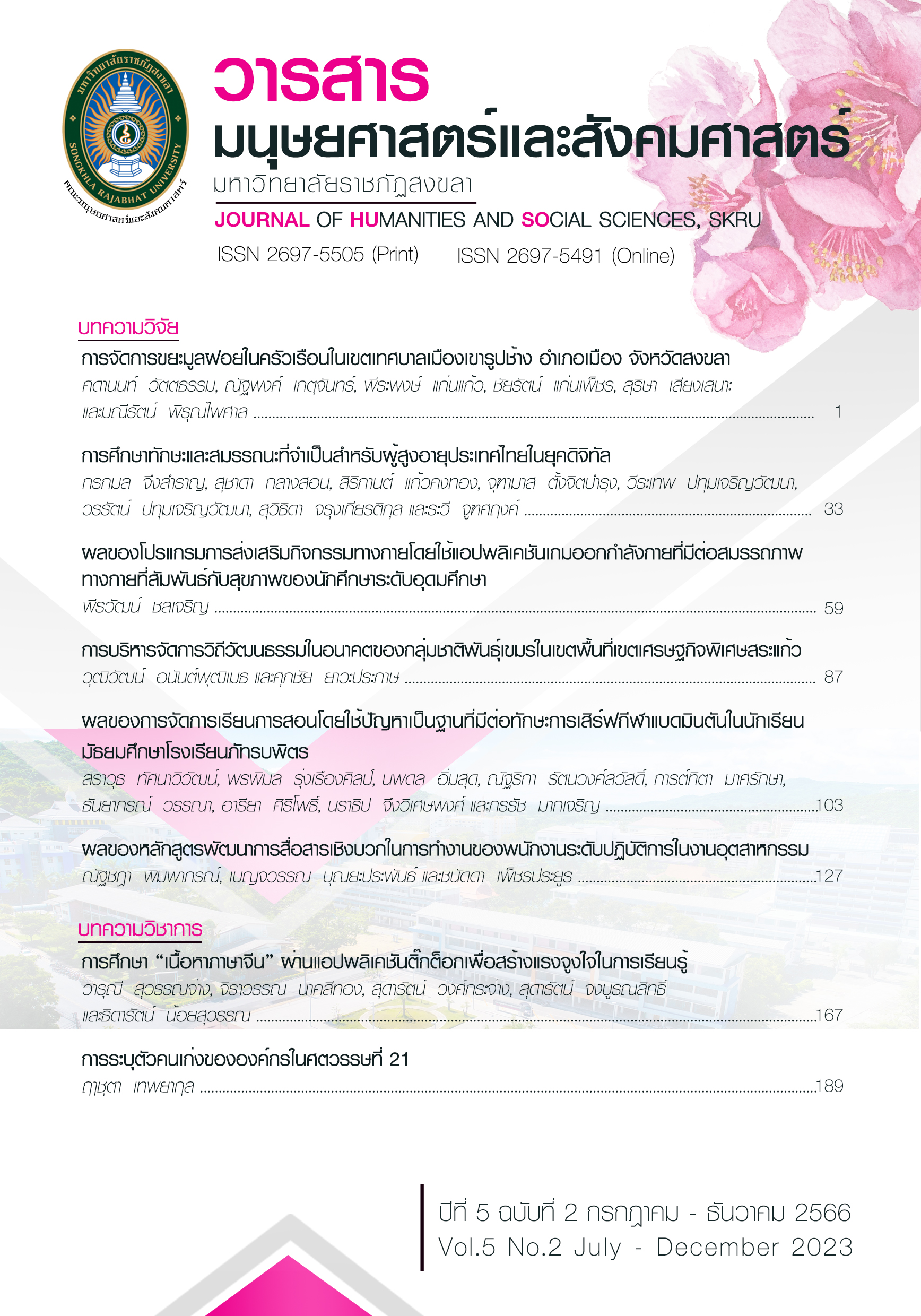A STUDY OF NEEDED SKILLS AND COMPETENCIES FOR THE ELDERLY IN THAILAND IN THE DIGITAL AGE
Main Article Content
Abstract
Research on a study of needed skills and competencies for the elderly in Thailand in the digital ageaimed to investigate the necessary skills and competencies for the elderly in Thailand in the digital age. This research was a descriptive research and data collection was done by a qualitative method. There were research procedures including reviewing, analyzing and synthesizing information from literature and research related to skills and competency of the elderly in foreign countries and Thailand. The instruments used were focus groups discussion questions and document analysis form then validated and verified through the input of luminaries, experts, government, private and civil society agencies from the representatives of the elderly. The research findings found ten skills and competencies needed for the elderly in Thailand in the digital age including 1) planning for self-improvement, 2) well-being, 3) literacy and basic numeracy, 4) financial planning and management, 5) media information, technology and digital, 6) safe living indoors and outdoors, 7) democratic citizenship or active citizenship, 8) lifelong learning, 9) living in society and 10) working and making a career. Each of these skills possesses different competencies involved in knowledge, abilities and characteristics that contribute to have those skills.
Downloads
Article Details

This work is licensed under a Creative Commons Attribution-NonCommercial-NoDerivatives 4.0 International License.
ลิขสิทธิ
References
Department of Older Persons. (n.d.). A set of knowledge on self-care and potential development for the elderly stability in life. Retrieved 12,05 2022, from https://www.dop.go.th/download/formdownload/th1529476181-813_0.pdf
Department of Older Persons. (2022). Older statistics. Retrieved 12,06 2022, from https://www.dop.go.th/th/know/side/1/1/1767
Heslin (2021). Does a growth mindset enable successful aging?. Work, Aging and Retirement, 7(2), 79-89. Retrieved 12,06 2022, from https://doi.org/10.1093/workar/ waaa029
Montakarn Chimmamee (2021). Developing work skills (RE-SKILL and UP-SKILL) to secure income for the elderly. Foundation of Thai Gerontology Research and Development institute.
The Office of National Higher Education Science Research and Innovation Policy Council. (2020). Promoting Life Long Learning for transformation and global crisis. Retrieved 12,05 2022, from https://www.nxpo.or.th/th/report/9976/
Office of the Education Council (2020). The National Scheme of Education B.E. 2560-2579 (2017-2036). Retrieved 12,06 2022, from http://backoffice.onec.go.th/uploads/Book/1540-file.pdf
Ratana-Ubol (2011). Education and lifelong learning of the Thai elderly. Foundation of Thai Gerontology Research and Development institute.
Silver, A. (2009). A European approach to media literacy: Moving toward an inclusive knowledge Society. In Divina F. & Jordi T. (Eds.), Mapping Media Education Policies in the World: Visions, Programmes, and Challenges (pp. 11-13). The United Nations-Alliance of Civilizations in co-operation with Grupo Comunicar.
Sirilamduan (2019). Pre-retirement financial planning guideline. Ubon Ratchathani University.
Svobodová, L., & Hedvičáková, M. (2017). The use of the social networks by elderly people in the Czech Republic and other countries V4. In A. K. Kar et al. (Eds.), Digital Nations – Smart Cities, Innovation, and Sustainability (pp. 50–60). Conference on e-Business, e-Services and e-Society. Retrieved 12,05 2022, from https://link.springer.com/chapter/10.1007/978-3-319-68557-1_6
UNESCO. (2017). Literacy and numeracy from a lifelong learning perspective. Retrieved 12,06 2022, from https://unesdoc.unesco.org/ark:/48223/pf0000247094


